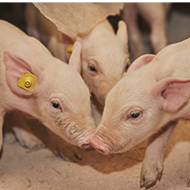Scientists map genome of inbred pig

“We believe this new genome assembly and transcriptome atlas will further enhance the utility of the Babraham pig as a biomedical model,” said Dr Schwartz.
A near-complete genome assembly for a highly inbred breed of pig has been developed by researchers at The Pirbright Institute.
The Babraham pig, a UK breed derived from the Large White, is genetically consistent across crucial immune-related gene complexes, enabling greater replication in immunological research.
Scientists hope the study, published in Immunogenetics, could pave the way for using the animal as a biomedical model to enhance both animal and human health.
“Once we had generated the genome assembly and assessed likely sources of error, we compared uniformity across the genome with another Babraham pig,” explained Dr John Schwartz, a bioinformatics specialist at Pirbright.
“Gene transcription data was then used from multiple tissues to investigate gene content and usage within several immune-related gene complexes. This enabled us to confidently characterize and annotate genes involved in immune responses within the Babraham pig, and compare these to other genomes to gain insight into their evolution and impact on health.”
Like humans, pigs have two slightly different copies of their genome – one from each parent. In individuals that are highly inbred, these copies are more identical. This similarity helps scientists piece them together because there are fewer variations to account for between the two copies.
Scientists hope the new genome will provide insight into viral pig diseases, such as African swine fever and influenza, and inform studies into zoonotic diseases. It is also hoped the genetic uniformity of Babraham pigs may also be used for studies of xenotransplantation.
Together with the genome assembly, researchers also generated 'transcriptome atlas' of the same breed, which records data to produce patterns of gene expression across various tissues within the organism.
“We believe this new genome assembly and transcriptome atlas will further enhance the utility of the Babraham pig as a biomedical model,” said Dr Schwartz.
Image (C) Shutterstock.



 The latest
The latest